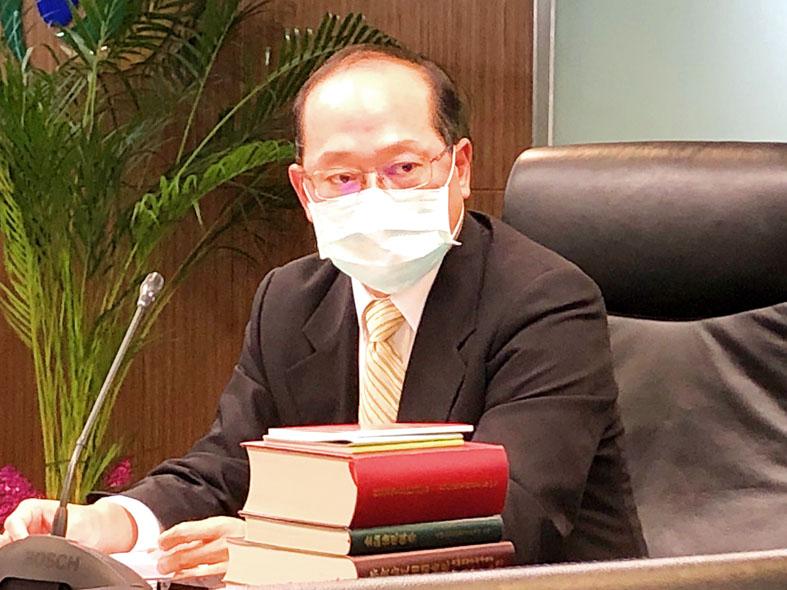The Financial Supervisory Commission is to set up new money laundering regulations for the nation’s cryptocurrency exchanges from July 1, requiring them to report transactions valued at more than NT$500,000 (US$17,770), the commission said yesterday.
The move came after the Executive Yuan earlier this month demanded that the commission establish regulations to prevent money laundering in the cryptocurrency industry.
The cryptocurrency industry includes local trading platforms for cryptocurrencies, cryptocurrency wallet providers and firms that conduct security token offerings, the Executive Yuan said.

Photo: Kelson Wang, Taipei Times
The commission plans to require cryptocurrency exchanges to report any transaction of more than NT$500,000 conducted in cash, or an equivalent amount denominated in a foreign currency, Banking Bureau Deputy Director-General Lin Chih-chi (林志吉) told a news conference in New Taipei City.
That is in line with the commission’s money laundering requirements for conventional banks, Lin said.
However, investors are unlikely to buy bitcoin with more than NT$500,000 in cash, as most exchanges require clients to link their bank accounts to their trading services, a commission official surnamed Yen (顏) said.
The BitoPro (幣託) exchange does allow clients to pay with cash at local convenience stores, but the amounts are limited to NT$20,000 at a single store, the official said.
For trades between different types of cryptocurrency — such as investors exchanging ether for bitcoin — the commission is to require exchanges to report large transactions and to ensure they fulfill the “know your customer” requirements, Lin said.
The commission is to hold a public hearing next month with eight local exchanges, including Maicoin Ltd (現代財富科技), Ace Digital Innovations Co Ltd (王牌數位創新) and BitoPro, he said.
While some exchanges have reportedly required their clients to reopen their accounts to fulfill the “know your customer” requirements, the commission had not issued such an order, Lin said.
The commission’s regulation of the industry is to focus on customer identity authentication and “know your customer” requirements, personal data storage and information security, Lin added.
Companies that fail to comply with the new regulations would face fines of up to NT$10 million, the commission said.

Hon Hai Precision Industry Co (鴻海精密) yesterday said that its research institute has launched its first advanced artificial intelligence (AI) large language model (LLM) using traditional Chinese, with technology assistance from Nvidia Corp. Hon Hai, also known as Foxconn Technology Group (富士康科技集團), said the LLM, FoxBrain, is expected to improve its data analysis capabilities for smart manufacturing, and electric vehicle and smart city development. An LLM is a type of AI trained on vast amounts of text data and uses deep learning techniques, particularly neural networks, to process and generate language. They are essential for building and improving AI-powered servers. Nvidia provided assistance

GREAT SUCCESS: Republican Senator Todd Young expressed surprise at Trump’s comments and said he expects the administration to keep the program running US lawmakers who helped secure billions of dollars in subsidies for domestic semiconductor manufacturing rejected US President Donald Trump’s call to revoke the 2022 CHIPS and Science Act, signaling that any repeal effort in the US Congress would fall short. US Senate Minority Leader Chuck Schumer, who negotiated the law, on Wednesday said that Trump’s demand would fail, while a top Republican proponent, US Senator Todd Young, expressed surprise at the president’s comments and said he expects the administration to keep the program running. The CHIPS Act is “essential for America leading the world in tech, leading the world in AI [artificial

DOMESTIC SUPPLY: The probe comes as Donald Trump has called for the repeal of the US$52.7 billion CHIPS and Science Act, which the US Congress passed in 2022 The Office of the US Trade Representative is to hold a hearing tomorrow into older Chinese-made “legacy” semiconductors that could heap more US tariffs on chips from China that power everyday goods from cars to washing machines to telecoms equipment. The probe, which began during former US president Joe Biden’s tenure in December last year, aims to protect US and other semiconductor producers from China’s massive state-driven buildup of domestic chip supply. A 50 percent US tariff on Chinese semiconductors began on Jan. 1. Legacy chips use older manufacturing processes introduced more than a decade ago and are often far simpler than

Gasoline and diesel prices this week are to decrease NT$0.5 and NT$1 per liter respectively as international crude prices continued to fall last week, CPC Corp, Taiwan (CPC, 台灣中油) and Formosa Petrochemical Corp (台塑石化) said yesterday. Effective today, gasoline prices at CPC and Formosa stations are to decrease to NT$29.2, NT$30.7 and NT$32.7 per liter for 92, 95 and 98-octane unleaded gasoline respectively, while premium diesel is to cost NT$27.9 per liter at CPC stations and NT$27.7 at Formosa pumps, the companies said in separate statements. Global crude oil prices dropped last week after the eight OPEC+ members said they would